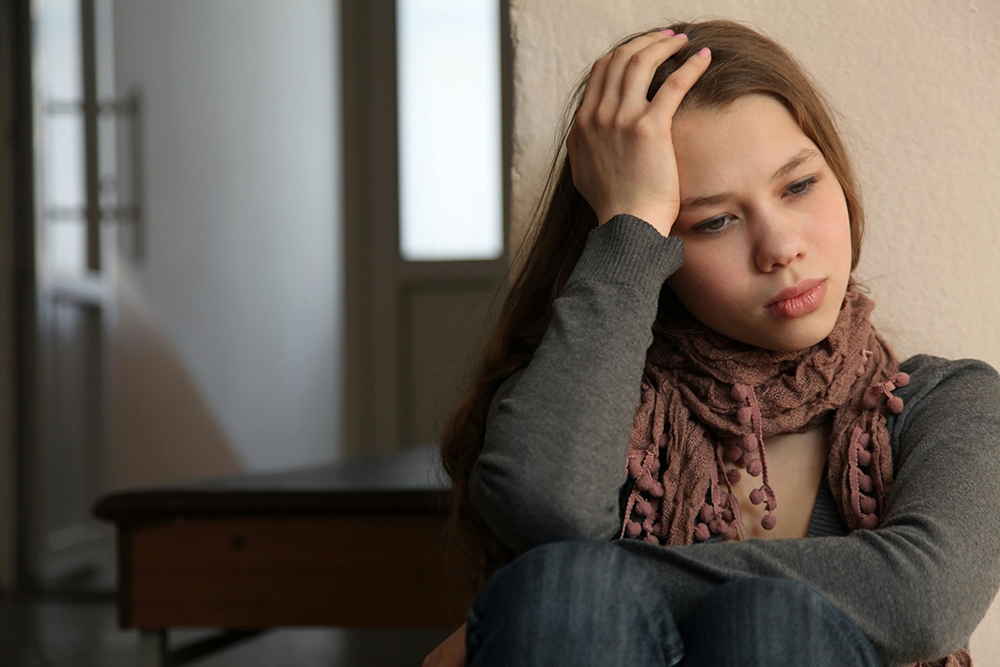
Teens struggling with both PTSD and addiction often feel trapped, emotionally drained, and like no one truly understands what they’re facing. These two conditions can worsen each other over time, making it feel even more difficult for teens to get better. Without the right support, both the trauma and the substance use can continue to spiral.
At Massachusetts Center for Adolescent Wellness, we treat both PTSD and addiction together. Our care team creates personalized plans that address the emotional pain and help teens build healthier coping skills
Understanding PTSD and Addiction in Adolescents
PTSD and addiction often show up together in teens who have lived through serious stress or trauma. Some common causes include abuse, violence, loss, or a scary event.
When trauma isn’t addressed, teens may turn to alcohol or drugs to numb feelings they don’t know how to manage. This repeating pattern is often what drives the connection between unresolved trauma and addiction in many young people.
Teens need more than just detox or talk therapy—they need support that helps them feel safe, understood, and connected. Addressing both trauma and substance use at the same time gives teens the best chance to heal.
Symptoms of PTSD in teens can include mood swings, irritability, sleep problems, panic attacks, and avoiding anything that reminds them of the trauma. Addiction may begin as an attempt to block these feelings but can quickly become its own problem. Early dual diagnosis treatment can stop both from getting worse.
How Trauma Can Lead to Substance Use
For many teens with PTSD and substance use issues, the drugs or alcohol may start as a way to escape emotional pain. Nightmares, anxiety, and constant fear can feel overwhelming and hard to escape.
Substances may bring short-term relief, but they often make PTSD symptoms worse over time. This leads to a cycle of using more and feeling worse.
Teens with PTSD and substance use often isolate themselves, struggle in school, or act out in ways they can’t explain. Without treatment, both the trauma and addiction can deepen. That’s why early, trauma-informed care is so important.
Stress hormones released during trauma can change the way a teen’s brain handles fear, memory, and emotions. This makes them more vulnerable to addiction and harder to reach with standard treatments. Trauma-informed care works by rebuilding trust, teaching safer coping tools, and helping the brain and body feel safe again.
Recognizing the Signs of PTSD in Teenagers

PTSD in teens can look very different from what adults experience. It doesn’t always show up as panic attacks or flashbacks. Sometimes, it shows in changes that are easy to mistake for attitude, defiance, or moodiness.
Teens may not have the words to explain what they’re feeling, especially if they don’t feel safe or understood. That’s why it’s important to watch for emotional and behavioral shifts that go beyond “typical” teenage changes.
Here are some signs that may point to PTSD in a teenager:
- Emotional Numbness: Your teen may seem disconnected, emotionless, or like they don’t care, even in emotional situations.
- Avoidance of People or Places: They may avoid specific locations, people, or topics that remind them of what happened.
- Hypervigilance: Teens with PTSD often feel “on edge” or easily startled, even when nothing dangerous is happening.
- Sleep Issues: They may struggle to fall asleep, stay asleep, or have frequent nightmares they don’t want to talk about.
- Difficulty Concentrating: PTSD can make it hard to focus in class or remember assignments, which may affect grades.
- Physical Complaints: Some teens report frequent stomachaches, headaches, or other pains with no clear medical cause.
- Risk-Taking or Self-Harm: Some may take dangerous risks or hurt themselves to cope with emotional pain they can’t express.
These behaviors are not just “acting out”—they are signs of deep emotional distress. Recognizing them early can help your teen get the right care before things worsen.
The Importance of Dual Diagnosis Care for PTSD and Addiction
When a teen is struggling with co-occurring PTSD and addiction, both conditions must be treated together for lasting recovery. Treating only the substance use without addressing trauma often leads to relapse or emotional setbacks.
PTSD affects how the brain responds to stress, fear, and safety—making it harder for teens to stay sober without trauma support. That’s why the best dual diagnosis treatment for PTSD and addiction focuses on healing both the emotional pain and the addiction at the same time.
Dual diagnosis care includes therapy, structure, and compassion. It helps teens rebuild trust, learn healthy coping skills, and feel safe in their own minds and bodies again.
Our Approach to Treating PTSD and Addiction in Teens

We use a trauma-informed approach designed specifically for adolescents. Every part of treatment is designed to help you feel safe, connected, and supported as you grow. Our adolescent trauma treatment addresses each teen’s unique story and symptoms with compassion and structure.
Here are key parts of our treatment model:
- Individual Therapy: Teens meet one-on-one with licensed therapists trained in trauma and substance use care.
- Group Therapy: Supportive peer groups help teens connect, express feelings, and learn they’re not alone.
- Family Involvement: Families are included through therapy and education to support healing at home.
- Cognitive Behavioral Therapy (CBT): CBT helps teens understand and change unhelpful thoughts and behaviors.
- EMDR and Trauma Therapies: We offer evidence-based trauma therapies that help the brain process painful memories in a safe way.
- Life Skills Training: Teens build daily tools like communication, stress management, and healthy decision-making.
Each teen gets a care plan that fits their needs, strengths, and recovery goals. Our team supports them through every step of healing.
Levels of Care at Our Massachusetts Treatment Center
We offer flexible, structured levels of care so teens can get the right amount of support at the right time. Our teen PTSD rehab Massachusetts programs meet teens where they are—whether they need daily care or ongoing support after treatment.
Partial Hospitalization Program (PHP)
In PHP, or day treatment, teens receive full-day treatment but return home or to supportive housing at night. This allows for strong structure and support while maintaining family connection. PHP offers daily therapy, group sessions, and regular check-ins to track your progress.
Intensive Outpatient Program (IOP)
Our Afterschool IOP is for teens ready to live at home while attending treatment a few days a week. They continue therapy and skill-building while transitioning back to everyday life. IOP helps teens stay on track with recovery and lowers the chances of slipping back.
Aftercare
Our adolescent aftercare program is a personalized, structured treatment plan designed to support teens after they have completed an initial rehabilitation program. This type of program helps ensure long-term recovery by providing ongoing care and support as teens transition back into their daily lives.
Each level helps teens move forward at their own pace, with care that changes as their needs change.
Family Support and Education
Family plays a powerful role in a teen’s recovery. When loved ones understand what their child is going through, healing becomes more possible.
PTSD and addiction can create distance, confusion, and conflict at home. Many parents feel lost, scared, or unsure how to help. That’s why we involve families every step of the way.
We offer family therapy, education sessions, and regular updates to help rebuild trust and communication. Families learn how trauma affects the brain, why addiction happens, and how to support without enabling.
When families are informed and involved, teens feel more supported and less alone. This lowers the chance of relapse and helps recovery last longer.
Building a Path to Long-Term Recovery

Recovery doesn’t end after detox or a few weeks of therapy. It’s a long process that needs guidance, structure, and patience.
At our center, we build long-term recovery plans with each teen and their family. We focus on stability, life skills, and healthy routines. Every plan is unique because every teen’s needs are different.
Here’s how we support long-term healing:
- Personalized Care Planning: We help each teen identify goals and map out their next steps after treatment.
- Aftercare Coordination: We connect families with trusted outpatient providers, therapists, or support groups in their community.
- Relapse Prevention: Teens learn how to spot early warning signs and what to do if they feel triggered.
- Coping Tools: Teens build real-world skills like managing stress, navigating emotions, and handling social pressure.
- Ongoing Family Support: We offer guidance for families adjusting to life after treatment.
By focusing on the future, we help teens feel confident and ready for what’s next.
Is Your Teen Facing PTSD and Addiction?
If your teen is struggling with trauma, mood swings, substance use, or risky behavior, you may be dealing with dual diagnosis PTSD. These challenges are real—but they’re also treatable with the right help.
At Massachusetts Center for Adolescent Wellness, we specialize in helping teens heal from both trauma and addiction in a safe, supportive environment. Our team is here to listen, guide, and walk with you every step of the way.
You don’t have to face this alone. Call us today or reach out online to learn more about our programs and how we can help
